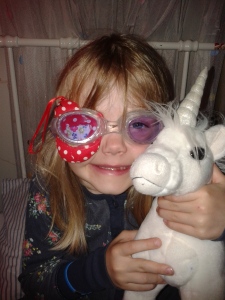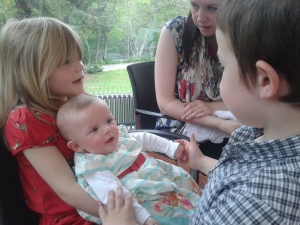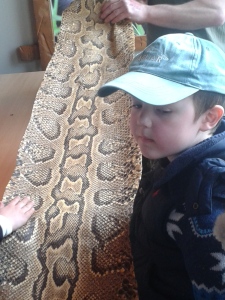Last week, I finished a two-year long personal development course. At the celebration event, we were all talking about the journey we had been on and the fact that this isn’t the end. It can’t be – we are always changing and developing, whether that is because we want to or because we have to. The difference is in how conscious we are of it and what direction we take it in. Throughout the event I was thinking, how would be life have turned out if I had know some of this stuff as a child? Granted, much of my learning wouldn’t transfer easily to the kids but some of the fundamentals should. Being open to leading on things that matter to them (i.e. leading for a purpose not for status or power), working with people effectively and in a way that fits with who they are as people, knowing who they really are in the first place – all things that I’ve been learning to be more open to and yet see in the kids every day. What the hell happens to us during the transition into puberty and then adulthood that suppresses this and how can I help them keep open to it?
A huge area of my development recently has been learning to work with a range of different people to deliver on some tricky, messy stuff, in a way that feels natural/right and fits with how I want to work (I’m trying to avoid the word authentic here but that’s what it is). A huge eye-opener for me was learning to acknowledge how I was feeling about a person or situation. Maybe it’s a societal thing, or the culture in which I work, or how I grew up (I suspect probably a mixture of them all) but I realised that I suppress a lot of how I’m feeling but it still has a big impact on what I then do. Now! I thought, if I could help my kids stay in touch with this side of them as they grow and encounter what life has to offer, wouldn’t that be a gift? And that’s exactly what my mum has been doing with the kids for some time now – adapting what she’s learned about Leadership Embodiment to help the kids recognise the fact that they have a choice about how they react in any given situation if they can be aware of how they are feeling about it. Ok, it might seem like some hippy-dippy s**t when you first hear about it but if you can get passed that, there is definitely something valuable here. I’ve been encouraging her to develop these ideas further as I think parents (and even a wider audience) would find it really helpful. It’s a different approach to parenting and so far, while it’s not a silver bullet, I’ve seen some amazing results. So, as a starter, I asked her to write a blog post about it. Really keen to hear what you think!
* * * * * * * * * * * *
When Keira asked me to do a blog post on what I’ve been learning and doing with Leadership Embodiment I thought, ooooo interesting, and this is such powerful stuff I’d love to share it people. But the clue’s in the title, embodiment is about your body’s reactive patterns to situations, how do I put that into words…
Here’s my take in it (so far). When we’re faced with a situation, whatever kind (exciting, scary, annoying) we react. I can’t really explain the ‘embodiment’ bit and that’s where the real insights come from but your physical reaction to a slight nudge can tell you loads about how you react to non physical ‘nudges’: coming back from holiday to 300 emails or having to have a tough conversation with your boss . This work helps you to explore how your head, your heart and your gut (Amanda calls it your hara) react.
Imagine a family member says ‘what are we doing for Christmas this year?’
Head might say “I don’t really mind, what do you think?”
Heart might sink: “just don’t make this a big deal”
Gut instinct might be “I wish I could go to Hawaii”
Or
Head, through gritted teeth, “I think it’s our turn, how about you come to us?”
Heart, ever hopeful “please say we can come to you”
Gut, churning
Or
Head “We’ll do lunch this year, I want to try out a Nigella cranberry sauce’
Heart “I love doing Christmas dinner”
Tummy rumbling at the thought
This last one is aligned. What would it be like if you could have more of this in your life? And it doesn’t have to be exactly aligned in order to say yes, it could be:
Head “I’d like to do something different this year”
Heart ever hopeful
Gut, be brave
I’ve being playing around with these ideas with my granddaughter. She was a bit upset one day, she was five at the time, and I said to her, imagine you have three boxes. One is labelled ‘shiny’, one is ‘noble’ and one is ‘awesome’ (this is how Wendy Palmer’s guru describes head, heart, hara).
What do you think would be in the Shiny box?
She thinks for a bit and says “toys?”.
Ok, anything else?
“em crayons?”
And what do you think is in the Noble box. I’m not sure what she’ll make of this, is this word in her vocabulary…
“helping the teacher to tidy up”
What else?
“being kind”
And what about the Awesome box?
“going really high on the swings”
More recently, she’s seven now, I said, if shiny and noble and awesome were music what would they be.
Shiny?
No hesitation “classical”
Noble?
She’s started to speak in that American/Australian way when her voices lilts up at the end of sentence? Like everything’s a question? “ that’s like when you put on a CD? And there’s a story? But there’s also music?”
And what about Awesome
“Rock”
Here’s an example of how I’ve helped my grandson put it into practice. I came home one day and he was having a major melt down with his Dad (he’s a kid, that’s his job!). He went into the kitchen in a huff. I said to him “that’s one awesome voice you have there but I think you could use it a bit more effectively”. Grandad arrives with a load of shopping, grandson starts to build a tower out of soup cans. “That’s pretty shiny dude! And how about you tune into your noble and help granddad put the shopping away?”.
I came back into the kitchen 10 minutes later and grandson is helping dad chopping vegetables for the stir fry. I like to think he found some of his shiny, noble and awesome and it helped him to cheer up a bit!
The idea is that when our shiny (creativity, sense of humour, logic), noble (kindness, thoughtfulness, honour) and awesome (courage, strength, rock n roll) is tuned into and aligned we can be ‘centred’. Then it’s much easier to say and get what we need.
For more stuff about this, check out my guru Amanda Ridings and her guru Wendy Palmer.
Comments welcome. And check out the first sentence, did you see what I did there 🙂
Lorna


